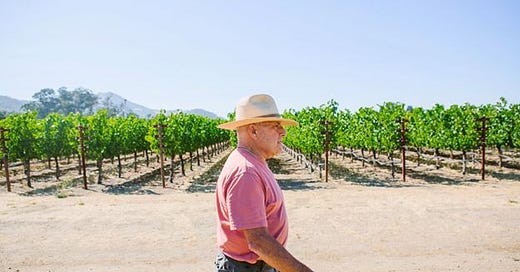NAPA VALLEY, Calif. — Father-and-son winemaking teams are no strangers to Napa Valley wine history. Some of them have worked well together, and some quite famously did not.
An expectation can exist that because one generation started a business that the following generation will continue it, but that’s not always the case. Thus the friction. Sometimes eras are also marked by profoundly different styles and philosophies.
Complant Wines is not so much one generation’s expectations coming to the fore as it is a shared vision and new beginning for its founders, Daniel and Sam Baron. Together they represent 70 years of winemaking in the Napa Valley. Complant, founded in 2017, is their chance to create wines of their own, blending Old World techniques with contemporary knowledge.
Daniel Baron has worked in California vineyards since the 1970s. He earned a master’s degree from UC Davis, followed by boots-on-the ground experience over several vintages in Bordeaux, including at Chateau Pétrus, where he met his mentor, Jean-Claude Berrouet. Returning to Napa, Daniel became Dominus’ first employee, working there for 12 years.
He's best known, however, as the winemaker at Silver Oak, a position he held from 1994 until 2016. While he was there, he also helped establish Twomey Cellars.
“I was about to retire from Silver Oak when Sam said he wanted to partner on making wine,” Daniel said. “It was time to do something together working with classic Napa varieties. I liked the idea of focusing on Napa.”
While it wasn’t an easy decision, it may have been the only one. Daniel said that though he has lived in Napa since 1971 he hasn’t been attracted to most Napa wines, finding many overblown.
“Natural wines are on one side of the spectrum where you don’t do anything,” he said. “There needs to be some human intervention for wine to be the beverage of moderation that displays time, place and variety through the lens of the human aesthetic, but not too much, not the other end of the spectrum of being overdone that no longer express time or place. There’s got to be a happy medium. That’s what we aimed to do, to make wines we want to drink.”
Growing up as Daniel’s son, Sam absorbed a lot about vineyards and learned more working for vineyard management companies in the Napa Valley.
His own degree from UC Davis in viticulture and enology was followed by harvest work in Napa, New Zealand and Burgundy. In California, Sam has worked for Broc Cellars, Nickel and Nickel and Kivelstadt as well as founding Les Lunes and Populis Wines.
Both Barons consider winemaking just one of the art forms they practice. Outside of wine Daniel plays the mandolin, and Sam is a potter. In naming their new project they opted for an obsolete French word that means a cultivated vine that produces fruit.
“Without the human there’s no cultivation,” Daniel said. “Humans determine terroir.”
With Complant they make two Napa Valley wines, a chardonnay and a cabernet sauvignon. Sam makes the chardonnay and Daniel the cabernet. A beautiful illustration of an apple blossom adorns the chardonnay bottles while the cabernet has a blackberry blossom, the illustrations done by local tattoo artist Kristina McDonald.
In serving as the humans determining terroir, the Barons sought the best possible fruit sources for their wines, tapping certified-organic Linda Vista Vineyard in Oak Knoll for chardonnay and getting cabernet from Oakville South Station, one of the original H.W. Crabb To Kalon Vineyard holdings gifted to UC Davis’ Department of Viticulture and Enology in 1947.
Daniel recalls visiting Oakville South Station in 1976 as a student with his professor, H.P. Olmo. At the time the experimental site was a mess. But in revisiting it in 2020 for Complant, he couldn’t believe the transformation.
“I have never walked on vineyard soil that has the tilth of this gravelly loam,” he said. “It’s the most amazing vineyard I’ve ever sourced fruit from in California. The numbers are perfect. From the first load, I’ve never seen cleaner grapes in my career.”
Daniel, who has another project in St. Emilion, France, says that to the Bordelais there is no terroir in California. But he counters that’s because too many winemakers are making high-alcohol wines that exaggerate everything except the site.
“There’s no such thing as physiological ripeness in grapes,” he concludes. “Grapes are ripe when the winemaker says they’re ripe. But to make classic wines you have to pick grapes when they taste like fresh fruit. We’re standing on the shoulders of people before us and still have things to learn.”
Virginie Boone has written about and reviewed the wines of Napa and Sonoma for more than a decade.






